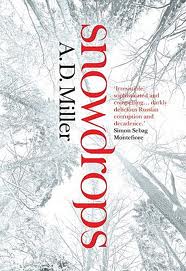Book review Tuesday: Snowdrops, by A.D. Miller
I’ve been reading a lot of books lately about places and cultures that I didn’t know I was interested in until I started reading about them. I learned that I was interested in Japan after reading Richard Lloyd Parry’s excellent People Who Eat Darkness, and I suppose, in the same way, I learned I was interested in Russia after reading A.D. Miller’s Snowdrops.
Snowdrops, which was shortlisted for the 2011 Man Booker Prize, takes place in early 2000s Moscow, at the height of Russia’s post-Soviet oil boom. The book opens with this disturbing definition, which sets the tone for the story that follows:
Snowdrop. 1. An early-flowering bulbous plant, having a white pendent flower. 2. Moscow slang. A corpse that lies buried or hidden in the winter snows, emerging only in the thaw
The opening scene of the book finds the narrator, Nick Platt, a late-30s British project finance lawyer, discovering his first snowdrop (and not the bulbous plant kind) in his Moscow neighborhood. We then step back a year or so and learn the story of Nick’s ill-fated involvement with a pair of (quite obviously sketchy) Russian women, Masha and Katya, their elderly aunt, and the parallel story of a disastrous business deal that Nick’s law firm undertakes with a shady figure they refer to only as “the Cossack.”
We know from the very beginning of the story that things aren’t going to end well for Nick, but we don’t know precisely how things are going to go awry. As the story unfolds, Nick’s folly becomes clearer and clearer to the reader, while he remains blissfully unaware of how stupid and dangerous his choices are becoming.
Snowdrops is not a perfect book. But it is a gripping book. For the most part, it’s fast-paced, well plotted, and the descriptions of Moscow and the brutal, decadent, selfish culture of post-Soviet oligarch culture in the early-2000s is excellent. Miller paints a sharp picture of Moscow, the surrounding countryside, and even Odessa, where Nick and his lady friends take a debauched vacation.
There were also certain lovely little observational passages that I enjoyed greatly. For instance, when Nick is out to dinner with Masha and her putative sister Katya, he asks them back to his place for some “tea” (euphemism alert) and Masha agrees:
Masha looked hard into my eyes and said yes. I waved at the waiter and wrote a little squiggle in the air with an imaginary pen, the international let-me-out-of-here signal that, when you’re a teenager and you see your parents make it, you think you never will.
The novel is interesting, structurally: it’s set up as a letter that Nick is writing to his now fiancée, confessing his dalliances and laying out the bare truth about his moral failings so that she knows what she’s getting into before she marries him. Quite early into the book, I thought, Run, lady! Run while you still can! Nick is pretty awful. And he’s quite unsparing in providing unsavory sexual details about his previous relationships, which, to me, seemed a tad unnecessary. Can’t you just tell your fiancée you’re an asshat without proving it by filling her in on the exact nature of your sluttiness, Nick?
Despite the quality of the writing and the effectiveness of the pacing of the book, I did have a few major issues with it:
1) You can see the bad thing (no spoilers!) that is going to happen coming from a mile away. Around halfway through the book, you realize that the jig is up, and you wonder why Nick is being such a f***wit, pardon my French.
2) Speaking of Nick, he really does suck. It’s hard to root for the guy. He’s insipid, selfish, and shallow. He realizes all of these things about himself, but blames them entirely on the fact of his being in Russia. Nick’s willingness to point to Russia as the sole cause for his moral collapse is part of the message of the book, which is that modern Russia has the capacity to unearth the dark side of our human nature, Lord of the Flies style, which we would prefer to believe does not reside in each one of us. Okay, fine, whatever, Russia is inherently corrupting. But Nick is still a bad person. The premise of the novel, that he is unburdening himself to his now fiancée, makes him appear even more cruel.
3) The side-plot about Nick’s misbegotten business venture with the Cossack is a snore. Perhaps I felt this way because I myself used to work in project finance as a lawyer, so I know intimately how boring it really is, but I could have done with less detail about the ins and outs of his obviously doomed venture with a bunch of sketchy Russian oilmen.
Nonetheless, I recommend Snowdrops for the rich, disturbing picture it paints of modern Russia and Russians, and for its lively pacing. It won’t take you long to charge through this one, and if you’re like me, you’ll come away with a new curiosity about Mother Russia.

Sounds good! I think I’ll give it a read
Definitely going to have to read. Basically, I read everything about post-Soviet Russia anyway, so not really a stretch. But is Russia inherently corrupting is an interesting question. Havingvisited n 1997 and then lived there in 2000 and 2002-2003, I would say or someone like Nick, yes, that is quite possible.